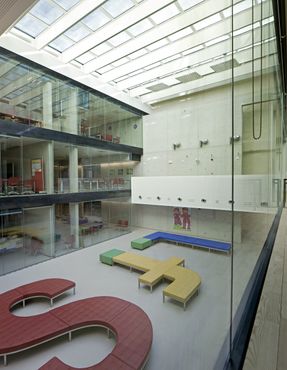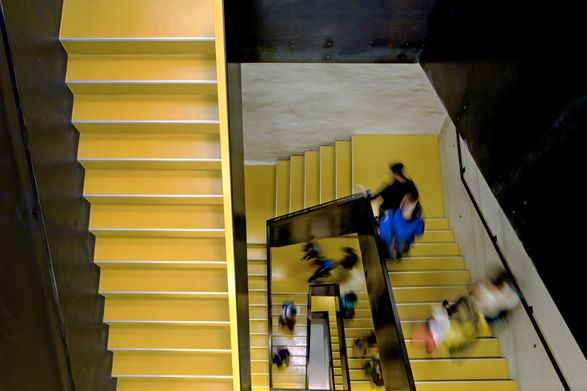Hanna Arendt Undergroung School
HANNA ARENDT UNDERGROUNG SCHOOL
Cleaa Claudio Lucchin & architetti associati
ARCHITECTS
Cleaa
ARCHITECT IN CHARGE
Claudio Lucchin /Cleaa
STRUCTURES
Herbert Mayer - Bolzano
PROYECT TEAM
Alessandra Fella, ALex Titone, Fabiano Bigatel (renders) Franco Quaglietta (maquette)
GROUP LEADER
Zh General Construction Company Ag
MANDATORS
Gaetano Paolin Spa , Gufler Bau Gmbh
SAFETY COORDINATOR
Arch. Roberto D’Ambrogio – Bolzano
ELECTRICAL PLANTS
Ing. Reinhard Thaler – Bolzano
BUILDING PROGRAM
“Hannah Arendt” professional high school underground extension, 09 classrooms 60 square meters, 06 workshops 70 square meters, 18 small private romms 8-15 square meters, central court 125 square meters, winter garden 25 square meters
MECHANICAL PLANTS
Ing. Marina Bolzan – Bolzano
COSTS
6.420.000 euro
CUBIC CAPACITY
11.000 m3
LOCATION
Via dei Cappuccini, 18, 39100 Bolzano, Province of Bolzano-Bozen,Italy
CATEGORY
Kindergarten
Designed by Cleaa Claudio Lucchin & architetti associati as the extension of the professional school,it highlights the unexpected potentialities of the underground architecture, challenging the limits of thesustainability culture as we thought so far.
As well as the contemporary design in historic centres. The idea of notaltering the ancient architectural context of the Capuchin friars convent -protected by the national heritageassociation- but the need for new spaces and classrooms, gave the architect the opportunity to create a“subterranean school appendix”:
four levels excavated 17 meters underground on which 9 classrooms, 6workshops , a winter garden and a utility room are distributed.
A challenging fight led the architects to solve consequent problems not only as structural, but particurarlyenviroimental issues.
STRUCTURE
The connection between the old building and the new one takes form of an extension to the existing corridorsituated at the first floor.
Lit through large glasses, and enclosed by a wall acting as a scenic backdrop this extension features as the onlynew architectonic element visible above ground.
The four underground floors were built after an initial stabilization of the area with micro poles and a reinforcedconcrete structure.
The rooms are distributed around the central void; starting from the top the first 2 floors host classrooms; thethird floor hosts the workshops and the last one is an utility room.
LIGHT
The lighting design was one of the main topic of the intervention : a costant use of glazed surfaces, in the largeskylights and glass walls of the rooms, lets natural light penetrating all internal spaces, allowing a special,continuous visual connection with the outside.
Therefore the atrium garden, the small winter garden and a series of skylights and solar chimneys give more lightand air to the whole building.
The artificial lighting is controlled by sensors neon varying temperature based on time of day and the weatherconditions outside.
HUMIDITY
Humidity has been removed inserting in the walls several layers consisting of insulation, sheathing and plasterspray that also provides protection against ingress of radon gas; to recall the excavation the walls have anirregular surface.
VENTILATION
Ventilation is guaranteed by programmed recycling of the air regulated by a mechanical system through ceilingdiffusers or grilles integrated into built in wardrobes.
THE BUILDING
Thanks to the glass walls, many viewpoints allow to perceive the building in all its depth.
The central court andthe full-height voids play with the materiality of the exposed concrete walls; the connection elements.
Such as thebig yellow staircase and the walkways punctuate the whole space; alongside the paths, numerous niches havebeen created as small private rooms for studying.



























